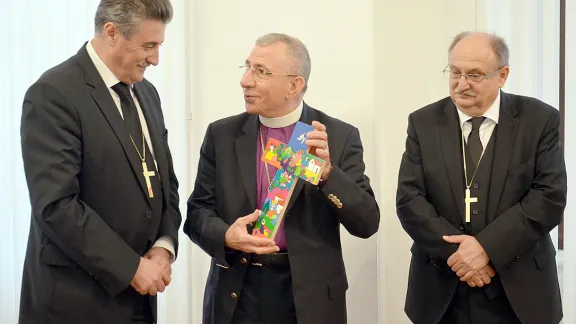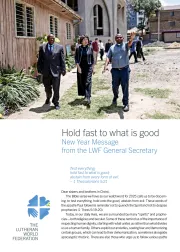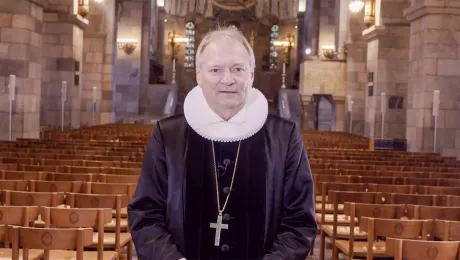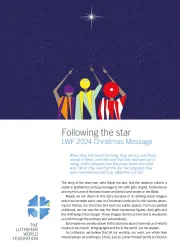
Bishops Ernisa and Filo from Slovenia presented with gift from Bishop Younan (center) at reception in Lutheran Church Ljubljana. Photo: LWF/H. Martinussen
LWF Meeting of Officers Greets Political and Faith Leaders
(LWI) – The Lutheran World Federation (LWF), Meeting of Officers has expressed its appreciation to the Slovenian government for safeguarding religious and cultural diversity in a nation that traces its establishment to the Reformation movement.
During meetings with the Slovenian President Borut Pahor and with Ljubljana Mayor Zoran Jankovič, members of the LWF governing body led by the President Bishop Dr Munib A. Younan heard how the government supports the different religious bodies in the country including the Evangelical Church of the Augsburg Confession in Slovenia. The LWF member church hosted the 12-14 November meeting of LWF Officers, who in addition to talks with government officials met with representatives of the Catholic and Orthodox churches and with Muslim leaders.
Younan, who is also bishop of the Evangelical Lutheran Church in Jordan and the Holy Land (ELCJHL), underlined LWF’s appreciation for the observance of 31 October—Reformation Day—as a national holiday in the majority Roman Catholic Slovenia.
“Today in our world, we are becoming more and more aware that none of us are independent, we are all interdependent. It is our role to speak more about how the values of faith can be implemented in a world that is secularized and broken. These values of peace, reconciliation and diversity are values we as religious leaders must have,” Younan said, reflecting on the conversations with Slovenian secular leaders.
At the meeting with President Pahor, the head of state offered to set up a working group to enable both the government and the Evangelical Church of the Augsburg Confession in Slovenia to explore ways of marking the 2017 Reformation anniversary.
Younan emphasized LWF’s commitment to ecumenism and interfaith dialogue, highlighting the 50 years of dialogue with Catholics and over 30 years with the Orthodox as important milestones. He referenced the recent signing of an agreement between the LWF and Islamic Relief Worldwide (IRW) to cooperate in humanitarian work as the first official cooperation between an international Christian and a global Islamic humanitarian organization.
In view of LWF’s humanitarian work, the General Secretary Rev. Martin Junge underlined Slovenia’s obligation to live up to its duty to protect refugees.
Ecumenical Collaboration
During a reception hosted by the LWF member church in the Lutheran church in Ljubljana, the President of the Catholic Bishops’ Conference Bishop Andrej Glavan emphasized the need to continue working together as ecumenical partners.
The Orthodox Church representative Paroh Milan said, “I feel that we belong to one family because all of us come from one God and that is why I am sure that we not only can but also have to work together to build a society which offers the opportunity to believe together and to be a witness.”
“When I speak about the church in Slovenia I do not speak about a small church but a church in a minority situation. Although we have a rich history with Primož Truber, (who translated the Bible) that is not enough for the church,” noted Presiding Bishop Geza Filo. “We want to be the church today within the context of a Roman Catholic majority. We want to continue contributing with our Protestant principles. We need to be able to bring a living word into the church and into society.”
Lutheran Tradition in Society
In Slovenia, the reformer Primož Truber is celebrated as the author of the first Slovene language printed book, and the founder of the Protestant Church of the Slovene Lands. Dr Marko Kersevan, head of the Truber Institute noted that even though only one percent of Slovenians belong to the Lutheran church, the Lutheran tradition has had an impact in society.
“The language became a unifying force in order to constitute the Slovenian nation. The written language of Slovenia came into being through Reformation and with the spirit of Reformation through the Reformation movement, ”Kersevan added.


